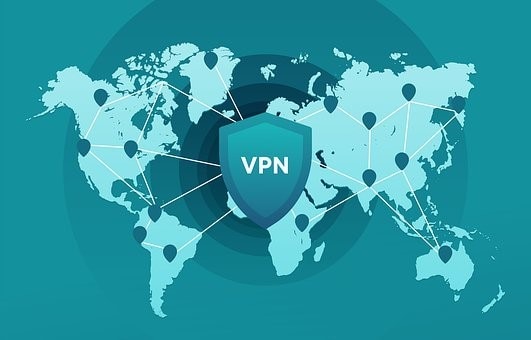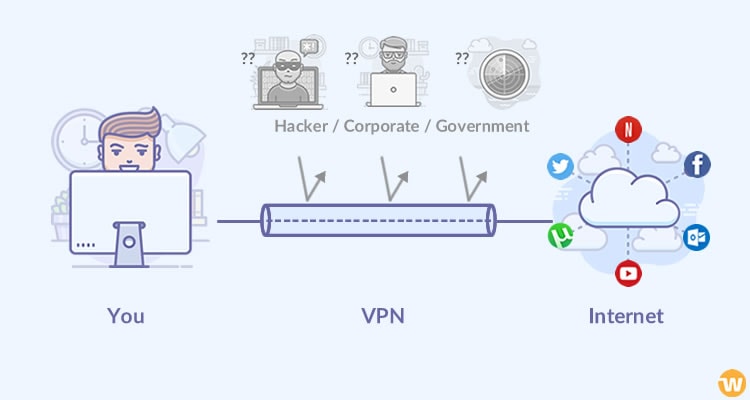What Is A VPN, What Is It For And How Can It Be Used
Table of Contents
What is a VPN ?
VPN networks are technologies that allow your computers with Internet connectivity to exchange data, both receive and send, with a public WiFi network as if it were a private WiFi network , with all the advantages that this can offer.
A VPN connection uses a remote server hosted somewhere in the world arranged by a provider so that you can connect to it and use its IP address as if it were yours.
What do you win with that? Well, you manage to hide your real location from your internet provider . And why do you want this? Among other things, this allows you to skip the famous geoblocks and enjoy exclusive content .
But they not only allow you to skip geo-locks to enjoy, for example, Facebook (China case) or Netflix and its exclusive content; It also offers you a plus of security , since they use an encryption system that protects the information you send and receive.
Thus, when using a VPN connection , even if some person or other entity manages to capture your information traffic, they could not see what you upload and download.


What are VPN networks used for?
Initially, VPN servers were used, most of all in the business environment, designed for when employees needed to work from home, or anywhere outside the office , keeping full access to the same information that could be accessed from their office, with the certainty and tranquility of having a completely secure connection.
That was in its beginnings, but over time, other more diverse and general uses were found, open to all kinds of people who enjoy the Internet. One of those uses, and perhaps one of the most famous, is to circumvent the censorship applied by governments and Internet providers .
One of the ways you can circumvent Internet censorship is bypassing geoblocks. These geographical blocks have become a tool for both “protection” and marketing by various entities.
One of the most famous cases are those of platforms such as Netflix or YouTube, platforms that have set as a requirement that you are in a specific country to enjoy certain content. VPN servers allow you to use the IP address of a server that is located in that country, deceiving Internet providers, giving you access to such content .
Let’s see definitively what are the uses of VPN connections in various areas:
- I work remotely. It is common in these times to work from home, or to travel to different parts of the world for business reasons. In those moments it is important to have all the tools and information that we have in our office at hand .
Accessing the private network of a company from a public place, such as a café or a plaza, can be considered at best crazy and irresponsible. Not by the site itself, but by using a connection open to the public, even if the connection is protected by a password, since it can be intercepted in many ways by malicious people, giving them access to that valuable information.
The use of a VPN server reduces the risks on the part of the worker and the company , since access to the network is protected by encryption.
- Skip geoblocks and avoid content censorship. By using a VPN , you establish a connection to the VPN server hosted in some part of the world and this, in turn, establishes a communication with the Internet provider and, being hosted in a country different from yours, the web servers will think that you are browsing from that country, being able to access content that is exclusive to them .
Following the same concept, it can be applied in cases where content is blocked in your country, such as Facebook in China. If not for the VPN services , people in China would not be able to use this social network.
- Security. VPN services in most cases include an encryption system for the data packets that are transmitted through it , so when using a public WiFi network , it is advisable to do so with a VPN in between.
Imagine that you need to access your bank accounts and you can only do it through the WiFi network of the nearest café. As it is a public network, there is no way you can completely trust it, so you would put the integrity of your data at risk, since anyone can capture your data and take your accounts.
Avoid spending those bad times using a VPN service that protects your data by an encryption system . So even if your data traffic is captured, they won’t be able to access more than a bunch of meaningless symbols .


Advantages and disadvantages of using a VPN.
Now that you know what a VPN is and what it is used for, now we have to see what its strengths and weaknesses are. So you can know when you can use it and which is better than not.
In favor:
- It can be used on any device that has Internet access and works with any application. Unlike proxy servers, a VPN server routes all Internet traffic, so you won’t be limited to using it only with the browser .
- Ease of connection and disconnection. After installing and configuring it, just by clicking a button you can activate and deactivate it when you need it.
- Security. It is ideal for using public WiFi connections and protecting the integrity of your data . You must bear in mind that for this you must include the connection encryption system.
- Mock geoblock. By using the IP of a server located in a country you need, you can access all the exclusive content of that region, circumventing the popular geo-blocking established by various platforms.
- Privacy before your Internet provider. If you do not like that your provider controls at all times what you do on the network, even if it is not a bad thing, then VPNs are your ideal solution. Of course, although your provider does not know what you are doing, the company that manages your VPN service will be able to know it.
Against:
- Price. It is true that there are a lot of free VPN services , however, that there is a paid version only means one thing: this version is (much) better . Whether they offer greater monthly data coverage, a greater number of simultaneously connected devices or more locations to access, all these virtues come at a price. Although it is true that there are some exceptions to the rule.
- Decreased speed. If you connect to a server very far from your place of origin, you may experience some latency .
- Non-infallible security. Currently there are increasingly complex methods to intervene our connections, so nothing assures us that it is 100% private. What is certain is that the more security protocols intervene, the less likely they are to suffer an attack that violates our privacy. Pay special attention to VPN connections based on the PPTP protocol .
How to use a Virtual Private Network?
In today’s computers you can connect to a virtual private network without installing additional programs. Of course, if you want, you can hire a VPN service to have greater coverage and benefits. Follow these steps to use a VPN :
In Windows 10:
- Enter Network and Internet , within the PC options .
- Open the VPN tab .
- Click Add a VPN connection.
- Fill in the information and start using it.
On MAC:
- Go to System Preferences and click Network .
- Click Add and select VPN from the dropdown menu.
- Fill in the form with the corresponding information.
On Linux:
To make use of a VPN server you must have installed a package called “network-manager-vpnc” and follow these steps:
- Click on the network icon and choose VPN Connections – Configure VPN .
- Press Add and follow the instructions to fill in the rest of the information.
- For list of top VPN providers today, you can check out the portal Top50vpn.com
Also Read: Top 5 Free VPNs You’ll Want To Use
- Mastering Algorithmic Trading Without Coding Skills - November 10, 2023
- 8 Tips for Procuring Technology for Your Business - August 15, 2023
- 5 Financial Best Practices To Follow When Starting A Business - July 6, 2023









